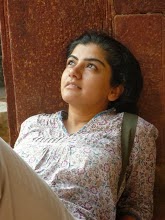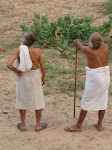And the Caravan Moves On: Ghulam Naqshband
He was a young man growing up in the 1930s in a small town of what is now Pakistan. From these provincial beginnings, he would go on to discover the vast world beyond his own—and bring the two together. Ghulam Naqshband, popularly known as the 'travel guru of India,' founded the Caravan of India, an influential cultural organization, in the 1940s and India's first branch of the Alliance Française. He was an employee of the Government of India when Partition came and one of only two Muslim government servants from what is now Pakistan who opted for India. No one else from his family joined him. But he believed in the idea of the new nation of India and played a vital role in the forging of its international identity. He was always the 'different' son of a Sufi Khalifa in Kasur, a town in the Pakistani Punjab best known for Kasuri Methi (fenugreek). When he was studying in an all-boys school and college, he took an immense interest in becoming pen pals with the 'goras' of other countries. When his brothers were simply being boys, he could often be found penning letters to friends in faraway lands that he had little hope of visiting then. From these pen friends he came to know of an international socio-cultural movement called the Caravan. The young man was immediately drawn to the core beliefs of the movement. "The Caravan believed that in the World of Tomorrow, the people will salute One Flag, symbolizing this great, round, rolling Earth created without frontiers," Mr. Naqshband reminisced. From that stage he began organizing activities that would bring people of diverse backgrounds and cultures together; the kinds of activities he would continue organizing for the rest of his life. As a young man he invited the editor of Star Magazine in Lahore, a Hindu who wrote under the pseudonym Qamar Jalalabadi, to visit predominantly Muslim Kasur and speak on Krishna at the Town Hall. The event was organized with help from some of Mr. Naqshband's similarly 'different' friends in Kasur and the town crier who went about announcing the event. The response was over a hundred people, almost all Muslim, coming to listen to the story of Krishna. Mr. Naqshband founded India's official branch of the Caravan in January 1944. The Statesman in its NEWS IN BRIEF, January 8, 1944 stated, "A Branch of the 'The Caravan', an American youth movement which aims at inspiring young people of all nations towards a better world order has been formed in Delhi. The Society's next meeting will be held on Sunday at 4, at 7, Rajpur Road, Delhi." This clipping along with several others from popular dailies of the 1940's form the first pages of Mr. Naqshband's meticulously prepared and preserved scrap book. As I flipped through this thick book full of clippings, complete with photographs and event details of the Caravan of India, the organization's activities struck me as almost a prototype for the Programmes Desk at the India Habitat Centre: events featuring statesmen, writers, artists, and intellectuals coming together from India and around the world. As I carefully turned more leaves of the scrap book, I discovered that in the 1940s this intercultural youth movement spread like fire. Eminent speakers and patrons from various walks of life and countries addressed the young members. A clipping of an article from October 1944 published by the New History Society, New York, of which the Caravan of India was a branch, states that the Caravan under the leadership of G. Naqshband intends to do big things in a big way. "In a country where the population is so gifted and varied, Mr. Naqshband and his branch may strike a unifying note that will electrify the different communities." Indeed the Caravan organized inter-communal Diwali and Id celebrations, hosted receptions for national and international dignitaries, held fundraising dinners and balls, and collected funds for famine relief and orphans. In June 1945, the Caravan organized a world-wide contest and announced $ 1000 as prize-money for the best essay on 'A United States of the World and a Universal Religion.' The Caravan of India's young members were most active in arranging lectures and art exhibitions on subjects ranging from trends in modern Indian literature to youth movements around the world, recreation, health, India's economic future, and feminist movements. Some of the Caravan's speakers, who were rather unknown then, are highly respected figures today. The movement of the Caravan of India took another turn when Lady Mountbatten and her daughter Pamela, the wife and daughter of the British Viceroy, responded to Mr. Naqshband's insistence that they take up an active role. A hesitant Pamela Mountbatten gave her first public speech in May 1947 with the encouragement of the Caravan's members. With Pamela and her mother as patrons, a new momentum grew behind the already popular Caravan activities. The movement's activities began receiving extensive coverage from national and international newspapers and magazines. This prompted many older people to seek membership in the Caravan. In retrospect, Mr. Naqshband feels that these new members did not join because they believed in the movement's cardinal principles of being a non-political, non-religious, and non-sectarian force for unity. "They thought of it as an elite networking group that would help them with social connections," he told me. The Caravan moved from its first residence at a home in the Civil Lines of Delhi to Room Number 42 of the Y.M.C.A in New Delhi. The move to New Delhi facilitated more guest lecturers and activities in the form of a reading room and an auditorium. The space for a reading room was obtained through a clever request to the Commander-in-Chief, Indian Army. Mr. Naqshband wrote to the chief requesting the donation of an Army tent that the Army Commandant used during his travels. The Army donated the tent and encouraged the Caravan's initiative. The tent was duly pitched on the Y.M.C.A. grounds and the Caravan had itself a reading room. How did he manage to work with so much dedication for the Caravan, though he also had a full time job as a government officer? His answer was as prompt as the man himself is: "Since we all worked after office hours and were committed to our movement, we worked voluntarily without expecting any money. We devoted some part of the day to the Caravan religiously." Even before I could think of the next question, Mr. Naqshband added. "Those days the leaders would come to our social gatherings to speak. They were deeply dedicated to the society that they wished to serve. They appreciated a platform such as the Caravan and happily shared their time and views. There were times when the response of acceptance to our last minute programmes was sent with equal promptness by the leader." He added that esteemed figures such as Pandit Nehru, Rajagopalacharyaji, Rajendra Prasad and other leaders were happy participants in the movement. He noted one incident in particular of which I saw many photographs in his scrap book. On the United Nations Charter Day in June 1947 the Caravan organized a last-minute celebration at the Constitution Club. Mr. Naqshband was in such a rush he could not personally hand over the invitation to Pandit Nehru's office, so he was forced to post it. Nehru, to everyone's surprise, arrived right in time for the event and spoke extemporaneously at the request of the gathering. After independence, the Caravan continued to make inroads as a major youth movement. Active branches had already opened in cities such as Lahore and Shimla. The group organized regular health and sanitation workshops in the refugee camps and 'good-will' concerts in the troubled post-partition times. But with success also came inevitable challenges. The movement became a bitter ground for political rivalries to play out. Older people with vested interests took control of a movement that was meant to be lead by the young. Mr. Naqshband left the scene quietly and never looked back. So what did he do after he left? He continued building institutions to bring peoples and nations together. "I started the Club Française," he told me. The Club was founded in 1952 and he became its secretary. Together with other French-speaking friends in India he held the first French classes and ran a small library out of his own home. "Basically we got hold of any French-speaking people and convinced them to either teach or join our club." The library began with the support of a retired I.C.S officer living in Mussoprie. Mr. Naqshband along with an officer from the French Embassy drove to Mussoorie one weekend and brought back the donation of books in the boot of his car. In 1955, the French government recognized Mr. Naqshband's promotion of Indo-French friendship by inviting him to visit France. The Club Française would later transform into India's first branch of the Alliance Française. Mr. Naqshband decided to join the travel business in India when it was still in its infancy. There were very few companies then organizing tours for foreign visitors to India, but Mr. Naqshband brought to his new job the organizational and public relations skills that founding the Caravan and the Cercle had given him. He became a pioneer of India's travel industry. Having now traveled all over the world to promote India as a destination, I asked him how he feels now about his life's work. He told me that he still wakes everyday up with new ideas and works towards achieving them. Today at 85 years old, he still goes to his office each day at a travel company, where he serves as Chairman Emeritus, with the same enthusiasm he had 60 years ago. Many of us are so stressed by our studies and work responsibilities that we find little time to even sleep and eat properly. How did Mr. Naqshband ever find the time for all the activities he has undertaken? His advice for young people today comes down to this: Time management and discipline are extremely important in the creation of a better society. If you have honesty of purpose, the rewards will come. Today you have the benefit of technology and social networking groups on the web. The youth should prioritize their lives and give some time back to their society and country. There is endless potential and one needs to keep looking for ways to make a contribution. Do not wait for people to make a contribution. Start making your own efforts from today. Mr. Naqshband has now outlived many of his colleagues and fellow Caravan members. But he's not giving up on working for his vision of the world anytime soon. "I believe in God—after all he saved me when I religiously cycled up and down from Old to New Delhi during the intense post-partition days for work. I also believe in unity of the world and I think God wishes that." During those troubled times at India's birth, Mr. Naqshband and the other young people stood against the division and mistrust to build a more united nation. They remind us how powerful youth with dedication and vision can be in shaping our country's future.
s of
Saturday, August 1, 2009
Subscribe to:
Post Comments (Atom)


2 comments:
Amazingly written. My compliments.
Thanks for the nice article. It will be lovely to know where can we have more information on this.
Post a Comment